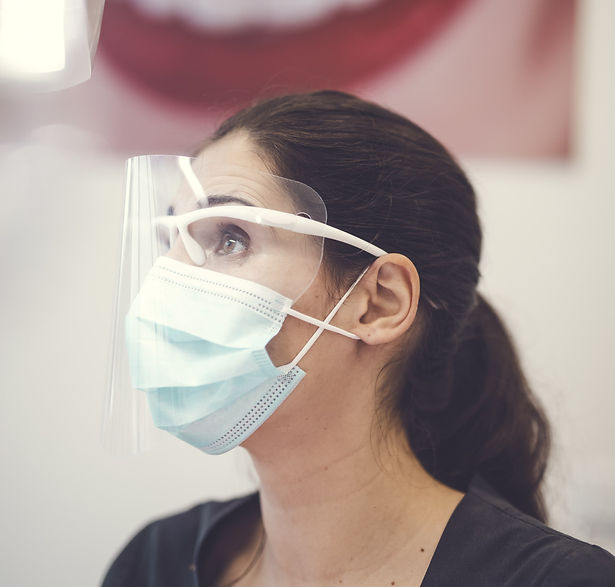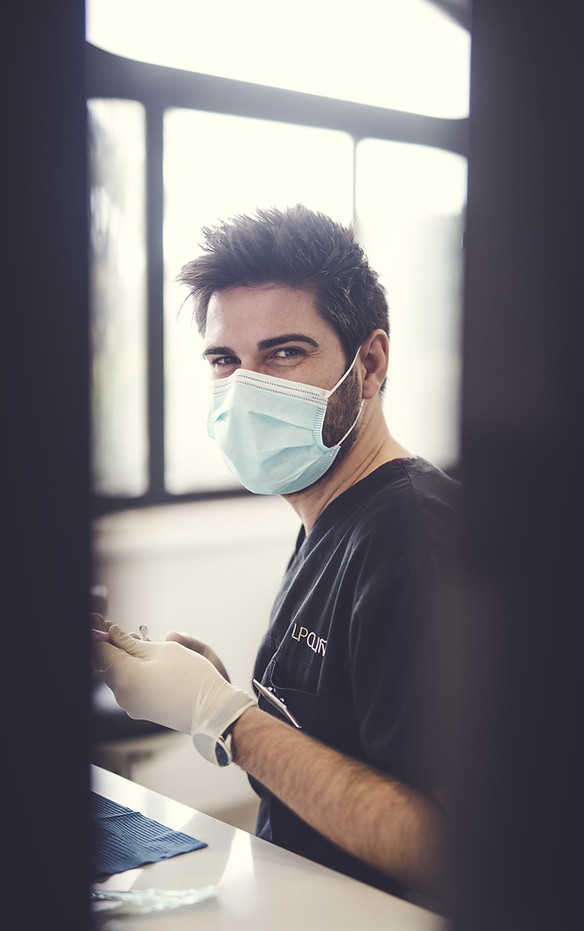
Periodontology
Taking care of the foundation of your smile: healthy gums, protected teeth
Periodontology is the area of dentistry that specializes in the diagnosis, prevention and treatment of diseases that affect the supporting tissues of the teeth — namely, the gums, bone and periodontal ligament. These structures are essential for keeping teeth strong and healthy throughout life.
At LP CLINIC, we believe that a beautiful smile starts with healthy gums. That’s why we pay special attention to periodontal health, treating problems at all stages — from gingivitis to advanced periodontitis.



What does Periodontology treat?
Through this specialty, we treat:
-
Gingivitis: superficial inflammation of the gums, generally caused by the accumulation of bacterial plaque;
-
Periodontitis: the most advanced form of periodontal disease, in which there is loss of bone and tooth support, which can lead to tooth mobility and loss;
-
Gum recession: when the gum “rises”, leaving the tooth root exposed;
-
Periodontal pockets: spaces between the tooth and the gum where bacteria accumulate;
-
Bleeding gums and persistent bad breath.
The Gums Speak:
Do you know how to interpret the signs?
Periodontal disease often progresses silently, especially in its early stages. That’s why it’s essential to pay attention to certain symptoms that may seem harmless but are clear signs that something is wrong with your gum health:
1. Bleeding gums when brushing or flossing
Gum bleeding should not be considered "normal" or blamed solely on vigorous brushing. In most cases, it indicates inflammation caused by the buildup of bacterial plaque — one of the earliest signs of gingivitis.
2. Red, swollen, or tender gums
Healthy gums are pale pink and firm in texture. If they appear red, swollen, or sensitive to the touch, there may be active inflammation — a sign that gingivitis is developing or has already progressed to a more severe stage.
3. Gum recession (exposed roots)
If your teeth look "longer" or the roots are starting to show, gum recession may be occurring. This condition exposes parts of the tooth not protected by enamel, increasing the risk of root decay and causing sensitivity.
4. Loose or shifting teeth
Teeth should feel stable and firmly in place. If you notice any mobility, it could be a sign of bone loss around the root — a typical symptom of advanced periodontitis.
5. Persistent bad breath (halitosis)
Bad breath that doesn’t improve with daily oral hygiene may be linked to excess bacteria in periodontal pockets. This commonly overlooked symptom is often present in chronic periodontal disease.
6. Sensitivity to cold or heat
Increased sensitivity — especially to hot or cold drinks — may be related to exposed tooth roots due to gum recession or the breakdown of supporting tissues.
7. Pus or discharge from the gums
The presence of pus between the tooth and gum is a sign of active infection and indicates a severe stage of periodontal disease. In these cases, it is crucial to seek treatment promptly.


From diagnosis to control:
the path to healthy gums

Periodontal treatment is always tailored to the stage and severity of the disease, with the main goals of eliminating bacterial infection, restoring the health of the supporting tissues, and preventing progression.
At LP CLINIC, we follow a phased and personalised approach, based on detailed clinical and radiographic examinations. Here's how it works:
1. Non-surgical decontamination phase (initial therapy)
The aim of this initial phase is to control inflammation and significantly reduce the bacterial load.
-
Scaling and root planing (also known as “deep cleaning”): removal of bacterial plaque and tartar from below the gum line, in the periodontal pockets;
-
Personalised oral hygiene instructions: patients are guided on effective brushing techniques, use of dental floss or interdental brushes, and advised on specific products;
-
Clinical re-evaluation after 4 to 6 weeks to assess the response to treatment.
In many cases, this phase alone is sufficient to control the disease. If not, more advanced treatment is required.
2. Surgical phase (for moderate to advanced cases)
If deep pockets persist, significant bone loss is present, or access to the affected area is limited, periodontal surgery may be necessary:
-
Access surgery: allows removal of plaque and tartar from deep areas and smooths the root surface;
-
Regenerative surgery: uses bone grafts, biomaterials or growth factors to attempt to recover lost bone and gum tissue;
-
Gum repositioning: in cases of gum recession, surgical techniques may be performed to improve aesthetics and protect exposed roots.
3. Periodontal maintenance phase
This is the most important long-term phase — and often the most neglected.
After active treatment, it's essential to keep the disease under control through regular maintenance visits, usually every 3 to 6 months depending on the patient's individual risk.
During these appointments:
-
Deep and specific cleanings are performed;
-
The condition of the gums and supporting tissues is assessed;
-
Oral hygiene instructions are reinforced.
Ongoing maintenance is crucial to prevent relapses and ensure the long-term health of natural teeth and previous treatments.
Expected results of periodontal treatment
With proper follow-up, it is possible to:
-
Fully control disease progression;
-
Restore gum health and tooth stability;
-
Significantly improve aesthetics and breath;
-
Avoid unnecessary extractions;
-
Preserve natural teeth for many years.
At LP CLINIC, we treat periodontitis with scientific rigour, advanced technology, and continuous care — ensuring effective, long-lasting, and personalised results.


